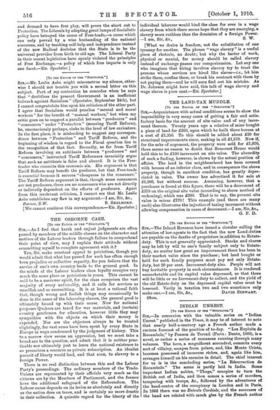THE OSBORNE CASE.
[To THE EDITOR 07 THE "SPECTATOR"]
Snt,—As I feel that harsh and unjust judgments are often passed by members of the middle classes on the character and motives of the Labour leaders through failure to comprehend their point of view, may I explain their attitude without committing myself to complete agreement with it P You, Sir, make constant appeal to patriotism, though you would admit that what has passed for such has often enough been prejudice or collective rapacity, for you believe that the service of one's own country leads to the general good. In the minds of the Labour leaders class loyalty occupies very much the same place as patriotism in yours. This cannot be said to be a narrower spirit, for the class comprises the vast majority of every nationality, and it calls for services as unselfish and as unremitting. It is at least a rational faith that, though wrong and foolish things may occasionally be done in the name of the labouring classes, the general good is ultimately bound up with their cause. Now for national purposes Quakers are taxed for war materials, and (certain) country gentlemen for education, however little they may sympathise with the objects on which their money is expended. Nor are the objectors always to be treated slightingly, for vast sums have been spent by every State in Europe in ways condemned by the judgment of history. This to a narrow view seems an oppression, but we must take a broad axe to the question, and admit that it is neither prac- ticable nor ultimately just to leave the national existence to so precarious a resource as private subscription. An idealist pursuit of liberty would lead, and that soon, to slavery to a foreign Power.
There is no real distinction between this and the Labour Party's proceedings. The ordinary members of the Trade- Unions are represented by their officials very much as the citizens are by the Members of Parliament, and the former hive the additional safeguard of the Referendum. The Labour cause depends on its levies as absolutely and directly as the nation does on taxes, and is certainly no more drastic in their collection. A quixotic regard for the liberty of the individual labourer would bind the class for ever in a wage slavery from which there seems hope that they are emerging, a slavery more ruthless than the dominion of a foreign Power.
[What we desire is freedom, not the substitution of one tyranny for another. The phrase "wage slavery" is a useful piece of rhetoric, no doubt; but why the barter of work, physical or mental, for money should be called slavery instead of exchange passes our comprehension. Let any one who imagines that hiring involves slavery try to treat the persons whose services are hired like slaves—i.e., let him strike them, confine them, or break his contract with them by not paying them—and he will soon find out his mistake. As Dr. Johnson might have said, this talk of wage slavery and wage slaves is pure cant.—En. Spectator.]


























































 Previous page
Previous page